African American Spirituals Examples: Faith & Hope!
African American Spirituals are a genre of songs that were created by enslaved African Americans in the United States, often reflecting their hardships, faith, and hope.
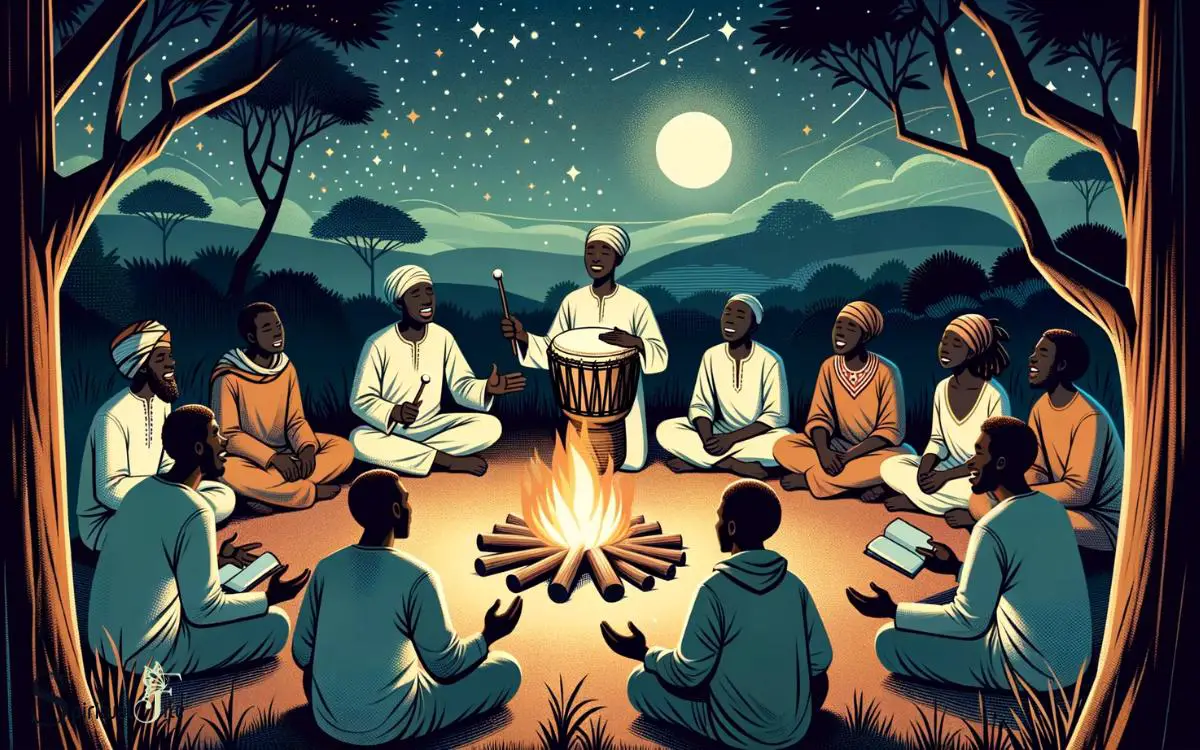
Key Takeaway
6 Interpretations: About African American Spirituals Examples
| Interpretation | Example |
|---|---|
| Resistance and Liberation | African American spirituals often conveyed themes of resistance against oppression and the yearning for liberation, as seen in songs like “Swing Low, Sweet Chariot” which alludes to the Underground Railroad and the hope for freedom. |
| Faith and Endurance | Spirituals frequently express deep faith and endurance in the face of adversity, with songs like “Wade in the Water” symbolizing the cleansing and healing power of faith in God. |
| Community and Unity | These songs often emphasize the importance of community and unity, as exemplified in “We Shall Overcome,” a powerful anthem of the Civil Rights Movement, conveying the message of solidarity and perseverance. |
| Hope and Deliverance | Hope for a better future and deliverance from suffering are common themes, as in “Go Down, Moses,” which draws parallels between the biblical story of Moses and the aspiration for freedom. |
| Spiritual Enrichment | African American spirituals also focus on spiritual enrichment, like “Precious Lord, Take My Hand,” which reflects the desire for divine guidance and strength in challenging times. |
| Expression of Grief | Some spirituals serve as an outlet for the expression of grief and sorrow, as in “Sometimes I Feel Like a Motherless Child,” which conveys the pain of separation and longing for connection. |
| Celebration and Joy | There are spirituals that celebrate life, joy, and the promise of a brighter future, such as “When the Saints Go Marching In,” expressing the anticipation of a joyful afterlife. |
Uncovering The Roots Of African American Spirituals
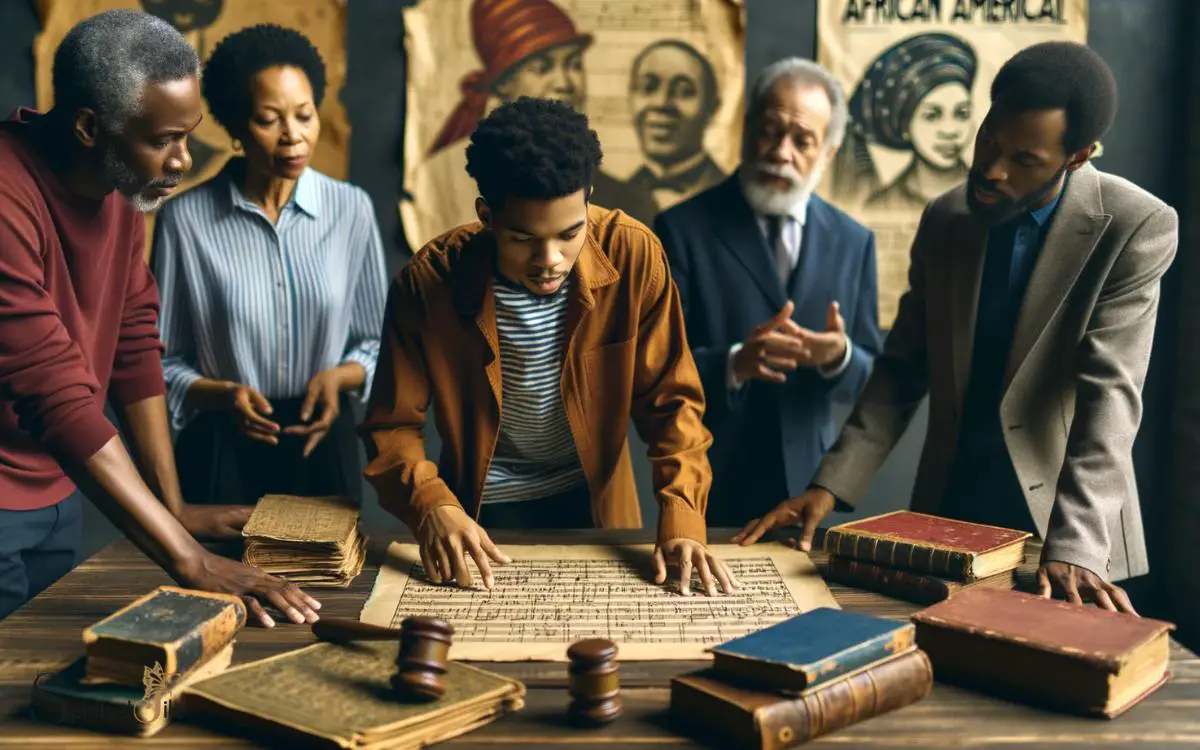
Uncovering the roots of african american spirituals brings to light the powerful examples of african american spirituals that have served as a reflection of resilience and hope in the face of adversity.
These spirituals showcase the unique cultural expression and deep connection to faith within the african american community.
African american spirituals hold a significant place in the rich musical heritage of african americans.
These evocative and soul-stirring songs reflect the deep roots of african culture and the harsh realities of slavery and the underground railroad.
In this section, we will explore the influence of african culture on spirituals and their connection to the historical context of slavery and the underground railroad.
Influence Of African Culture On Spirituals
The african ancestors of african americans brought with them a vibrant musical tradition.
This cultural influence shaped the development of spirituals in several ways:
Call-and-response: A prominent feature of african culture, call-and-response singing style can be found in spirituals. The leader would sing a phrase or line, and the rest of the group would respond with a corresponding line or phrase.
Improvisation: African musical traditions often emphasized improvisation, allowing individuals to express their emotions and thoughts through spontaneous musical variations.
This improvisational element can be seen in the freedom of interpretation and expression found in spirituals.
Rhythmic and melodic patterns: African music is characterized by complex rhythmic patterns and distinct melodic structures. These influences can be heard in the syncopated rhythms and melodic contours of spirituals.
Drumming and percussion: African music places great emphasis on percussion instruments such as drums.
While enslaved africans were denied access to drums, they adapted by using their bodies, hand clapping, and improvised percussive instruments to create rhythmic accompaniment for their songs.
Connection To Slavery And The Underground Railroad
Spirituals are deeply intertwined with the experiences of slavery and the underground railroad, serving multiple purposes within these contexts:
Expression of emotions: Spirituals served as a medium for enslaved africans to express their emotions, hopes, and sorrows. Through their lyrics and melodies, spirituals conveyed messages of resilience, faith, and the longing for freedom.
Communication and resistance: Within the oppressive system of slavery, spirituals often contained hidden messages and encoded information about escape routes and safe houses on the underground railroad.
These songs became a means of communication and a source of strength for those seeking freedom.
Community building: Spirituals fostered a sense of community and provided solace in the face of adversity. Enslaved africans sang together, forming bonds and sharing experiences, creating a collective identity that transcended their individual circumstances.
Preservation of african heritage: Through spirituals, african americans preserved elements of their african cultural heritage.
By infusing their songs with african musical styles, rhythms, and melodies, they retained a connection to their ancestral roots and passed down their traditions to future generations.
The roots of african american spirituals intertwine african culture, the brutal realities of slavery, and the pursuit of freedom through the underground railroad.
This powerful musical form continues to resonate today, reminding us of the strength, resilience, and rich cultural heritage of african americans.
Trademark Features Of African American Spirituals
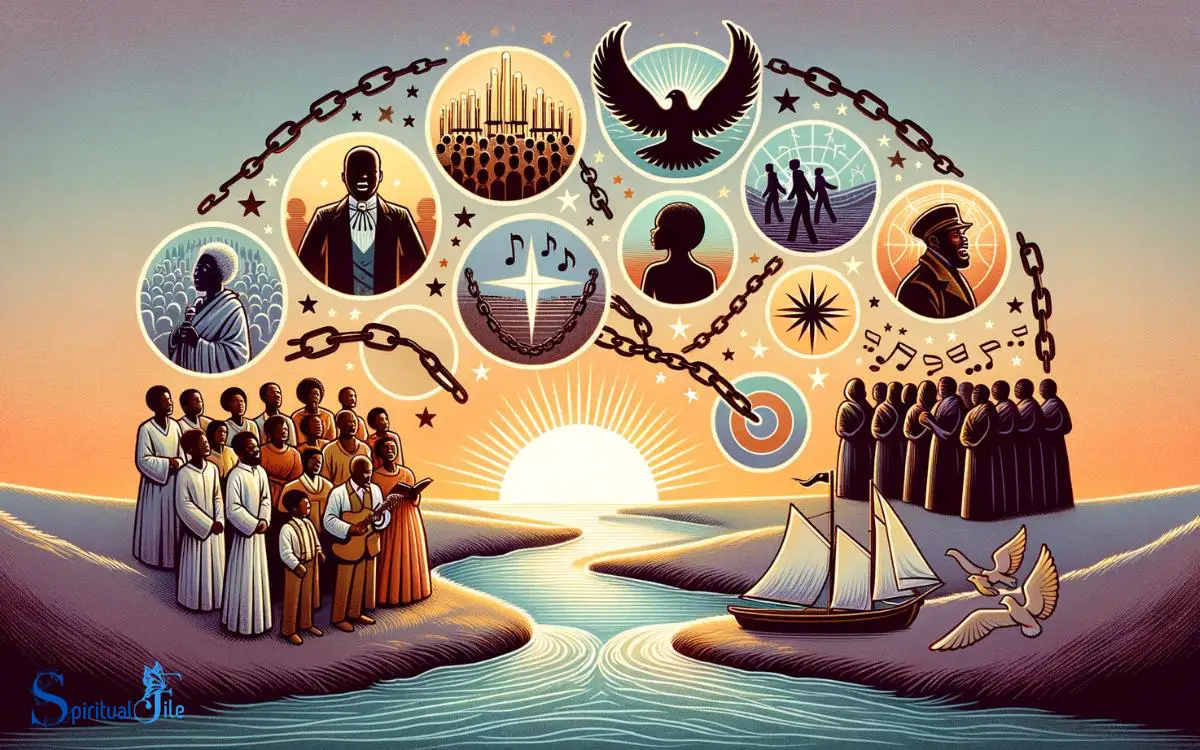
African american spirituals showcase distinctive trademark features, such as rhythmic melodies, call-and-response patterns, and profound lyrics reflecting the struggles and hopes of enslaved africans.
These examples of spirituals exemplify the rich cultural heritage and resilience of the african american community.
Call And Response Format:
- African american spirituals are known for their distinctive call and response format, which is a musical technique that involves a leader calling out a line and the chorus or congregation responding with a repeated line or phrase.
- This interactive style creates a powerful sense of community and participation in the music, allowing for a dynamic and energetic performance.
- Call and response is deeply rooted in african musical traditions, where it was used not only in spirituals but also in work songs and other forms of communal music.
Use Of Biblical Imagery And Themes:
- African american spirituals often incorporate elements of biblical imagery and themes, reflecting the influence of christianity on the enslaved african american community.
- The use of biblical references helps convey a sense of hope, faith, and transcendence in the face of adversity.
- Biblical stories and characters, such as moses leading the israelites to freedom or jesus as a symbol of salvation, are frequently invoked in spirituals as powerful symbols of liberation and redemption.
Expressions Of Hope, Freedom, And Resilience:
- One of the trademark features of african american spirituals is their expression of hope, freedom, and resilience in the face of oppression.
- These songs were born out of the experiences of slavery and served as a means of expressing the deep emotions and aspirations of the african american community.
- Spirituals often convey messages of hope for a better future, freedom from bondage, and the inner strength to endure and overcome adversity.
- Through their lyrics and melodies, spirituals provided a sense of solace, empowerment, and solidarity among african americans, inspiring resilience and a steadfast belief in the ultimate triumph of justice and equality.
Noteworthy Examples Of African American Spirituals
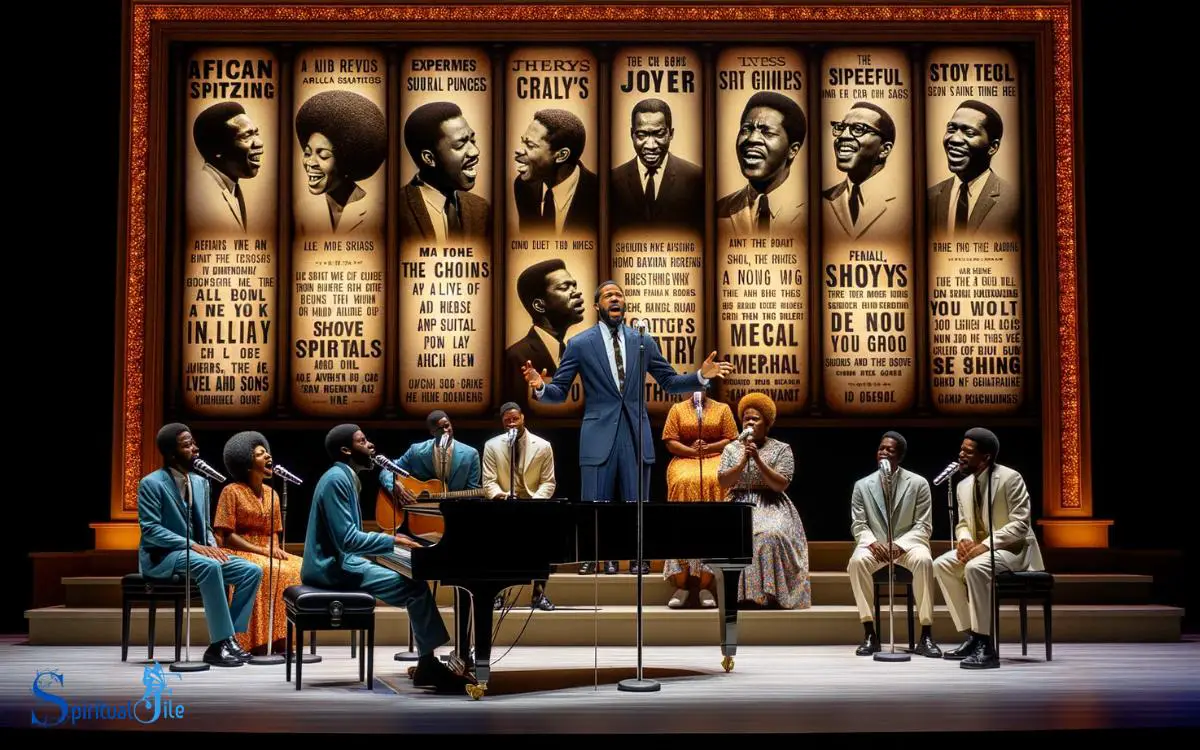
Explore the richness of african american spirituals with these noteworthy examples showcasing the powerful blend of religious and cultural influences.
Experience the soulful melodies and heartfelt lyrics that have left an indelible mark on american music history.
African American Spirituals Examples
Throughout history, african american spirituals have played a significant role in expressing the experiences and emotions of the african american community.
These powerful songs have resonated deeply with people, offering comfort, hope, and the opportunity to communicate shared struggles and aspirations.
In this section, we will explore some noteworthy examples of african american spirituals, each carrying its own unique message and significance.
Swing Low, Sweet Chariot
- Symbolic of the journey towards freedom: This spiritual represents the hope for liberation and the yearning to escape oppression.
- Spiritual guidance and protection: It evokes a sense of divine intervention, as the chariot is believed to transport the singer to a better place, away from suffering.
- Conveys the longing for a better future: The repetition of the phrase “swing low” expresses a desire for a state of peace and tranquility.
Wade In The Water
- Symbolic references to biblical stories: The act of wading in the water refers to the israelites crossing the red sea during their escape from slavery in egypt.
- Represents a call to action: The lyrics of this spiritual encourage individuals to embrace the power of faith and take the necessary steps towards freedom and salvation.
- Recognition of water as a source of healing and cleansing: The act of wading in the water is believed to possess purifying qualities, providing strength and protection to those who partake.
Go Down, Moses
- Reflects the story of moses: This spiritual draws inspiration from the biblical story of moses leading the israelites out of slavery in egypt. It symbolizes the desire for liberation and the hope for a just and equal society.
- Speaks to the collective struggle for freedom: The lyrics convey a deep yearning for deliverance from the chains of oppression, resonating with african americans during times of slavery and beyond.
- Remains a powerful anthem of resilience: “go down, moses” served as both a source of inspiration during times of adversity and a reminder of the ongoing fight for equality.
The african american spirituals mentioned above are just a glimpse into the rich tapestry of songs that have shaped the african american experience.
They continue to serve as a testament to the resilience and spirit of this community, inspiring generations with their poignant messages.
Influence On African American Spirituals
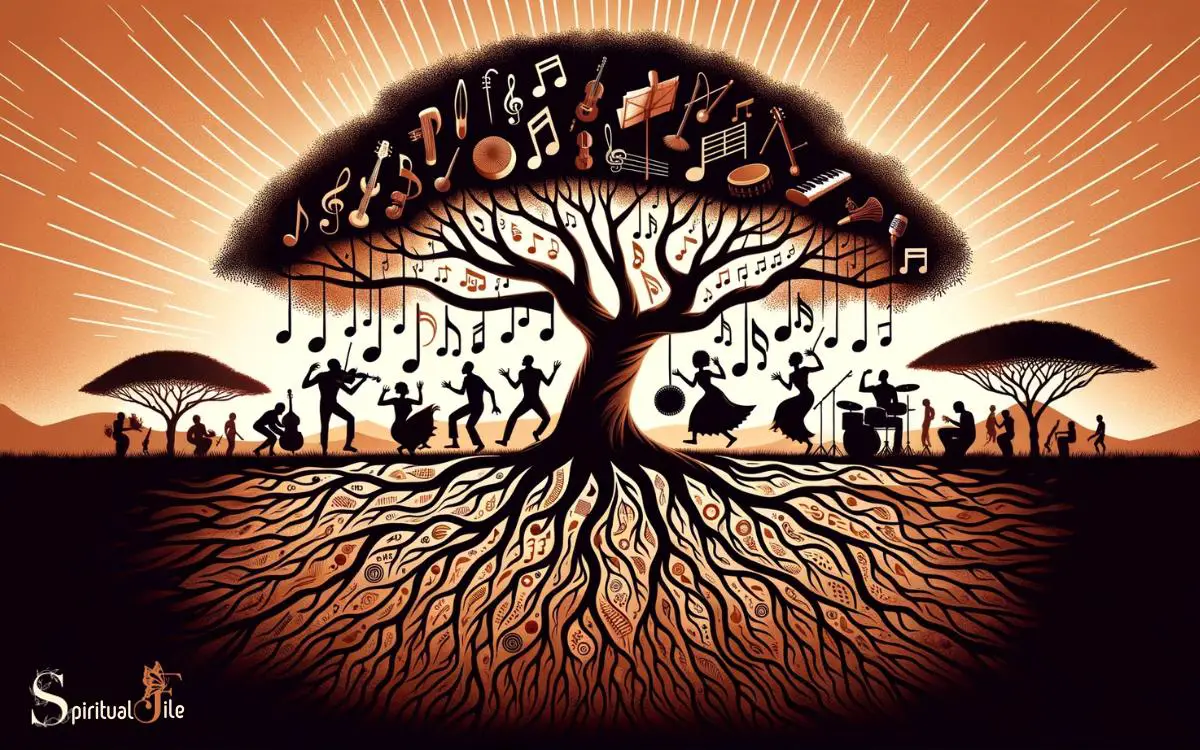
African american spirituals, such as “wade in the water” and “go down moses”, have greatly influenced gospel and blues music, providing the foundation for these genres with their rich melodies and powerful lyrics.
Through their emotive storytelling and expressions of faith and resilience, these spirituals continue to impact the landscape of music today.
African American Spirituals Examples: Influence On Gospel And Blues Music
From the cotton fields to the church pews, african american spirituals have played a significant role in shaping the music landscape.
These songs served as a means of expression, bearing witness to the struggles and resilience of enslaved african americans.
The powerful messages embedded in spirituals extended beyond their original context and laid the foundation for gospel and blues music.
Here, we will explore the similarities and differences between spirituals, gospel, and blues, as well as the evolution of musical expression.
Exploration Of Similarities And Differences:
Lyrics:
- Spirituals: Rooted in religious themes, spirituals often focused on biblical stories, faith, and hope.
- Gospel: Like spirituals, gospel music emphasizes christian themes, with an emphasis on praise, worship, and the power of faith.
- Blues: Blues music delves into the struggles of everyday life, often expressing pain, loss, and heartbreak.
Musical structure and melody:
- Spirituals: These songs were characterized by call-and-response patterns, allowing for communal participation. Melodies were repetitive and rhythmic, utilizing pentatonic scales.
- Gospel: Gospel music expanded upon the call-and-response structure, incorporating harmonies, choruses, and dynamic vocal techniques. Melodies became more complex, influenced by various musical styles.
- Blues: With its origins in spirituals, blues music retained the call-and-response tradition but added instrumentation, such as guitars and harmonicas. Melodies focused on expressing emotions and often employed the use of blue notes.
Performing context:
- Spirituals: Initially sung by slaves in plantation fields or during secret gatherings, spirituals were passed down orally as a form of resistance and communication.
- Gospel: Gospel music emerged within african american church communities, where it became an integral part of worship services and religious gatherings.
- Blues: Originating from the mississippi delta, blues music was performed in juke joints, on street corners, and at social gatherings, reflecting the struggles and experiences of african americans.
Evolution Of Musical Expression:
From spirituals to gospel:
- As african american communities gained greater freedom and opportunities for education, spirituals evolved into more organized and structured forms of expression, giving rise to gospel music.
- Gospel songs incorporated elements of spirituals but embraced more diverse musical styles and arrangements. The addition of instruments, harmonies, and exuberant vocal techniques transformed the music into a vibrant celebration of faith and spirituality.
From spirituals to blues:
- While spirituals conveyed messages of hope and liberation, the realities of post-slavery life demanded new forms of musical expression. Blues emerged as a response to the hardships faced by african americans in the early 20th century.
- Borrowing elements from spirituals, blues music infused personal narratives, sorrowful melodies, and expressive instrumentation. It provided a platform for african americans to voice their pain, frustrations, and desires.
African american spirituals laid the groundwork for gospel and blues music, influencing the lyrical content, musical structure, and performing contexts of these genres.
Spirituals acted as a powerful medium for self-expression during times of oppression, paving the way for future generations to carry on their legacy through gospel and blues.
Social Movements And Civil Rights of African American Spirituals
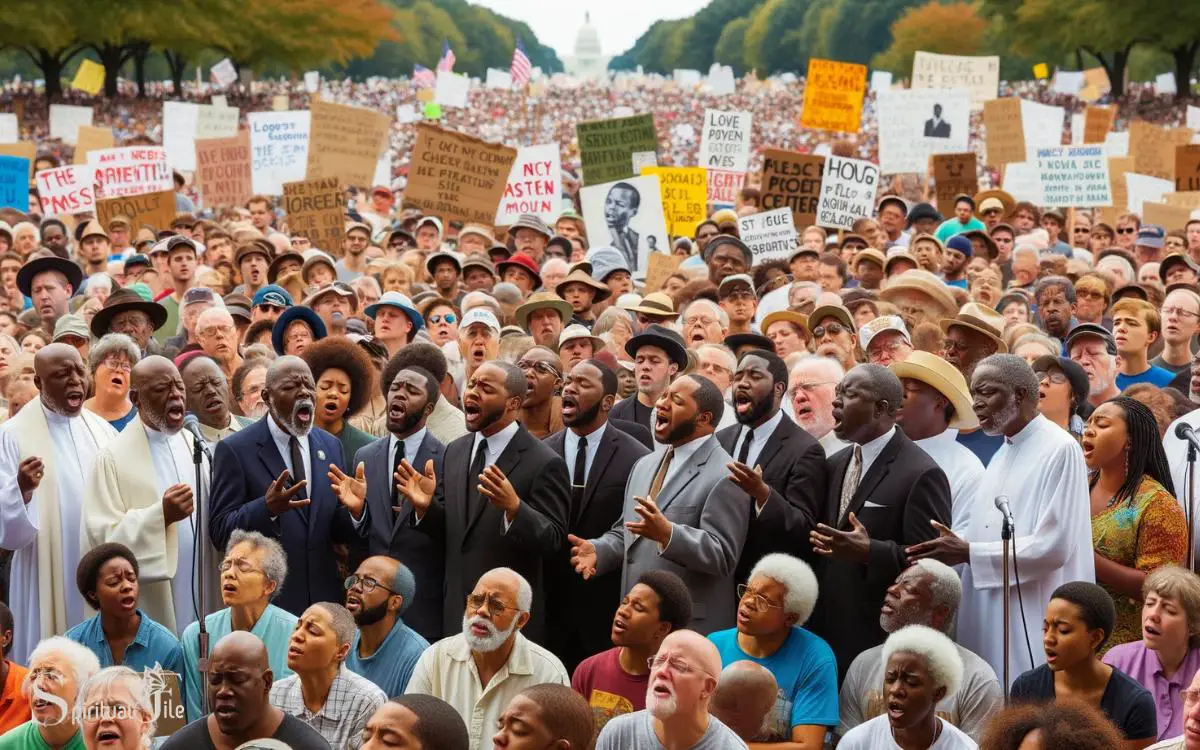
African american spirituals played a crucial role in social movements and civil rights, serving as a powerful tool for expressing collective experiences and inspiring change.
These spirituals embody the resilience, hope, and struggle of the african american community, leaving an indelible mark on history.
African American Spirituals Examples: Role In Social Movements And Civil Rights
African american spirituals played a crucial role in the social movements and civil rights struggles that have shaped american history.
These powerful and deeply resonant songs served as a means of communication, inspiration, and unity for african americans during times of oppression and inequality.
By blending religious themes and african cultural traditions, these spirituals became a formidable force in the fight for freedom and equality.
In this section, we will explore the ways in which these spirituals inspired freedom fighters and activists while uniting communities in the pursuit of equality.
Inspiring Freedom Fighters And Activists:
Encoded messages: African american spirituals often contained coded messages that masked their true meanings, enabling enslaved individuals to communicate covertly.
These coded lyrics conveyed vital information about escape routes, safe houses, and impending dangers.
Resistance and defiance: Spirituals conveyed a sense of resistance and defiance against the cruel and dehumanizing realities of slavery.
They served as an outlet for frustration, sorrow, and anger, empowering freedom fighters and activists to endure and stand up against injustice.
Mobilizing energy: The emotional power of spirituals stirred a sense of unity and resolve among african americans, motivating them to join together in the struggle for civil rights.
These uplifting melodies and lyrics allowed individuals to find strength and courage within themselves and their communities.
Uniting Communities In The Pursuit Of Equality:
Collective identity: African american spirituals helped solidify a collective identity among enslaved and oppressed individuals.
Through shared experiences and the communal singing of spirituals, a sense of unity and solidarity was fostered, providing a foundation for community activism.
Gathering places: Spirituals were often sung in churches, secret meetings, and underground spaces where african americans could gather without suspicion.
These spaces became essential hubs for organizing, planning, and strategizing, contributing to the growth of the civil rights movement.
Inspiration and hope: Spirituals provided inspiration and hope during times of struggle.
The messages of liberation, deliverance, and eventual freedom found in these songs uplifted spirits and encouraged individuals to continue their fight for equality, even in the face of adversity.
African american spirituals exemplify the power of music as a tool for social change. They allowed freedom fighters and activists to communicate, resist, and overcome the challenges imposed by a racially divided society.
Through their inspiring messages and ability to unite communities, spirituals played a vital role in the quest for civil rights and continue to be a testament to the resilience and determination of african americans throughout history.
How can African American Spirituals reflect faith and hope, as opposed to being spiritually enslaved?
African American Spirituals serve as powerful examples of spiritual enslavement values being overcome by faith and hope. These songs, born out of the struggles of slavery, convey a deep sense of resilience and strength, offering a source of comfort and inspiration amidst oppression and adversity.
Legacy And Continuing Influence Of African American Spirituals
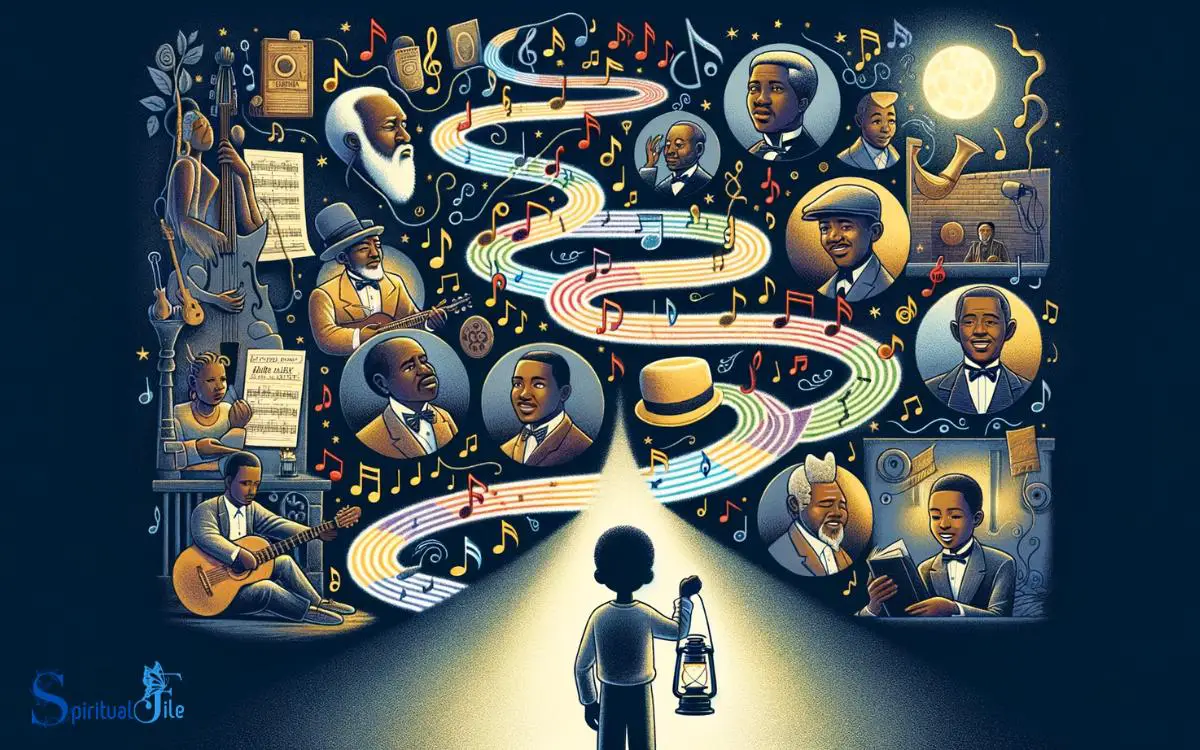
African american spirituals serve as enduring legacies that continue to impact music today. These powerful examples of soulful expression and resilience resonate with listeners, offering a glimpse into the rich cultural heritage of african americans.
African American Spirituals: Legacy And Continuing Influence
African american spirituals hold immense cultural significance within the african american community.
These powerful songs emerged during the era of slavery in the united states and have continued to shape the musical landscape ever since.
The legacy and continuing influence of african american spirituals can be seen through their cultural significance, perpetuation through music education and performance, and the broader impact they have had on american music as a whole.
Cultural Significance In The African American Community
- African american spirituals served as a means of expressing the pain, struggles, and hope of enslaved african americans during a dark chapter in american history.
- These spirituals were rooted in african musical traditions and infused with biblical themes, providing solace and strength to those enduring the hardships of slavery.
- African american spirituals became a form of resistance and a way to preserve african customs and cultural identity in a hostile environment.
- The lyrics of these songs often contained hidden messages used for communication and planning escape routes on the underground railroad.
Perpetuation Through Music Education And Performance
- African american spirituals continue to be taught and celebrated in music education programs and institutions, ensuring their preservation for future generations.
- Through choral arrangements and performances, these spirituals are shared with diverse audiences, spreading awareness of their history and cultural significance.
- The study and performance of african american spirituals provide a powerful and emotional connection to the experiences of enslaved african americans, fostering empathy and understanding.
- Music educators and scholars recognize the importance of teaching african american spirituals as part of a comprehensive music curriculum, promoting inclusivity and diversity.
The legacy of african american spirituals extends beyond the confines of the african american community.
These powerful songs have transcended time and continue to resonate with people from all walks of life.
From their cultural significance and perpetuation through music education to their broader impact on american music, african american spirituals remain a testament to the strength and resilience of a community that defied oppression through the power of song.
Conclusion
To sum up, african american spirituals are a significant part of the cultural heritage of african americans. These powerful songs have carried the emotions, struggles, and resilience of a people who endured slavery and fought for freedom.
Whether performed in churches, work fields, or hidden gatherings, spirituals served as a beacon of hope and a means of communication.
The examples showcased in this blog post provide a glimpse into the rich history and deep emotions embedded within these songs.
From the haunting melodies of “swing low, sweet chariot” to the uplifting lyrics of “wade in the water,” each spiritual offers a unique perspective and a testament to the strength and faith of african american ancestors.
These songs continue to resonate with audiences today, reminding us of the power of music to inspire, heal, and connect us to our shared history.






